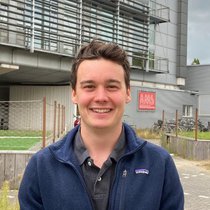In order to tackle the housing and climate crisis at the same time, we need affordable, low-emission construction. The consortium of this project therefore researches different aspects of sustainable highrise buildings, aiming to translate their findings into tendering rules across the Netherlands.
Sustainability versus efficiency
The Dutch construction industry faces a complicated double challenge. Currently, there is a shortage of over 331,000 homes. Eliminating this shortage requires an acceleration in construction. For example: the G4, the four biggest cities in the Netherlands, aim to build 30,000 homes per year until 2030, yet the actual realized capacity stays far below this ambition. At the same time, the construction industry is responsible for 44% of global CO2 emissions, and continuing business as usual—never mind accelerating construction— jeopardizes realizing climate goals.
“It's time for a unified approach, where we invest in data-driven methods in the design and development process and create the necessary financial room to enable truly sustainable business cases and to accelerate with biogenic materials.”
Joke Dufourmont
Former Program Developer Circularity in Urban Regions at AMS Institute

Cocreation process
Sustainability and efficiency can go hand in go hand in hand; by using industrialized and modular construction methods, efficient and sustainable logistics, and low-emission materials. This project aims to accelerate the development of climate-neutral construction in the G4 by mainstreaming sustainability criteria in the tender procedure for high-rise buildings. It does so by researching the feasibility and impact of low-emission and biobased materials and logistics strategies for high-rise buildings in the Netherlands. The process is guided by a co-creation process of stakeholders, representatives from the public and private sector, and will cumulate in a living lab that tests the outcomes in a tender in Amsterdam Zuidoost.
“The rising cost for traditional estate construction and serious climate change, will stop new developments soon. We need a radical different approach with new standards, Circular/CO2 embodied materials and industrialized construction and logistics.”
Richard ruijtenbeek, Senior Advisor Circular Development City of Amsterdam

The New Normal
In 2023, fourteen different parties worked on seven studies, each contributing to uniform sustainable tendering in their own way. Research subjects included air quality, transport, and materials. Their results were presented in a booklet: ‘Hoog Hout haalbaar’, with summaries, conclusions, and recommendations to contracting municipalities. Final findings will be translated into policy by means of ‘The New Normal’ (‘Het Nieuwe Normaal’), to be applied in tender rules across the Netherlands. Read more about the results on openresearch.amsterdam.
Download Hoog Hout haalbaar here
| Duration: |
|
Project members
Partners
























